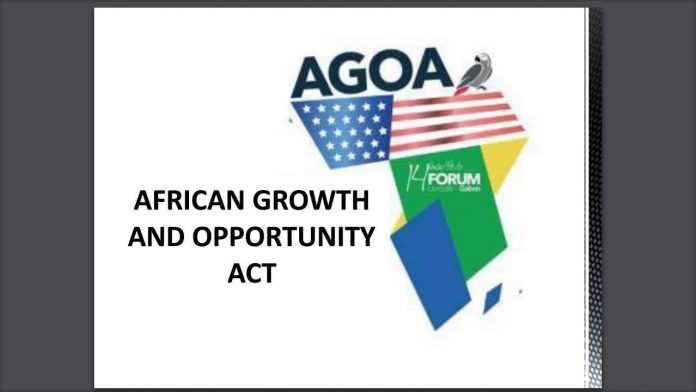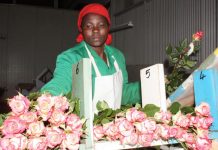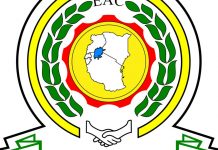AGOA Pressure
An African Union delegation arrived in Washington, D.C., on Jan. 19 to press the Obama administration, Congress and key private sector stakeholders on the reauthorization of the African Growth and Opportunity Act (AGOA). The delegation is led by Sekh’ulumi Ntsoaole, Lesotho’s minister of trade and industry, cooperatives and marketing, the delegation includes Gabriel Tchango, minister of Trade, Small and Medium Size Enterprises, Handicrafts and the Development of Services, Gabon; and Etienne Ghislain Sinatambou, minister of Foreign Affairs, Regional Integration and International Trade, Mauritius. AGOA is set to expire in September 2015. African leaders would like to see it reauthorized for at least 15 years, saying that would convey a strong signal of confidence to the U.S. business community and to African partners, and ensure that trade with the U.S. is occurring in a predictable, reliable and legally secure basis.
ECOWAS Tariff
An Economic Community of West African States Common External Tariff agreed to in October 2013 is scheduled to take effect January 2015, a major step toward regional economic integration. Under the new regime, the same customs duties will apply to all goods entering ECOWAS members, regardless of where in the area they are entering. ECOWAS countries that comprise the West African Economic and Monetary Union (WAEMU) already operate a common external tariff of zero percent for essential social goods, 5 percent for goods of primary necessity and raw materials, 10 percent for inputs and intermediary goods, and 20 percent for consumption goods. A fifth band of 35 percent for goods that contribute to economic development was added at the insistence of Nigeria. ECOWAS members will be allowed a five-year transition period from the effective date of the new tariff.
India Trade Surges
Africa’s trade with India, projected to reach $100 billion this year in 2015, up from $57 billion in 2013, is growing at a faster rate than China’s trade with the continent and likely will overtake France and the United States to become the continent’s second biggest trading partner after China. China exchanges about $160 billion worth of goods a year with Africa and more than a million Chinese, most of them laborers and traders, have moved to the continent in the past decade. Africa’s top five trading partners (goods trade) in 2013 were China, with $156.4 billion worth of goods in bilateral trade; the United States, $72.1 billion; France, $61.6 billion; India, $57.0 billion; and Spain, $48.1 billion. The top five investment partners in 2012 were Britain, with investments of $7.5 billion; the United States, $3.7 billion; Italy, $3.5 billion; China, $2.5 billion; and France, $2.1 billion.
Air Cargo
Turmoil at U.S. west coast ports proved a boon to international airfreight in 2014, with Africa registering a 15 percent revenue growth in perishables cargo in November. That figure “easily outperformed” other origin regions, which saw a combined growth of around 5 percent, according to the latest monthly data from WorldACD. The International Air Transport Association projects Africa will be the second fastest growing international airfreight market after the Middle East between 2014 and 2018. It says the Middle East market will experience a compound annual growth rate of 4.7 percent in the period, followed by Africa with a CAGR of 4.4 percent, Asia-Pacific and Latin America, both with a CAGR of 3.8 percent; and Europe and North America at 3.0 percent CAGR and 2.8 percent CAGR, respectively. Air Cargo Africa, a biennial international event, is scheduled to take place in Johannesburg, South Africa, from February 25-27.
Mobile Market
Sub-Saharan Africa is the second-largest mobile technology market after Asia and the fastest growing one, with the region’s mobile users projected to reach 346 million by 2017. According to Gallup, nearly two-thirds (65 percent) of households in 23 countries in sub-Saharan Africa had at least one mobile phone in 2013, with median growth of 27 percent since 2008 and median annual growth of 5 percent. The median percentage of households with landlines in the same 23 countries in 2013 is 2 percent, unchanged from 2008. Mobile phone penetration in 2013 shows lower in rural areas and lowest among households with lower household incomes.
Private Equity Confidence
Analysts say the Ebola crisis has not deterred investor interest in the continent, evidenced by IHS Holding Ltd.’s success in raising $2.6 billion in equity ($2 billion) and debt ($0.6 billion) in November from major private equity firms, including AIIM, Goldman Sachs, Wendel of France and Emerging Capital Partners. It was one of the biggest private funding packages for an African business. Writing in Financial Nigeria, Raj Kulasingam said the success of IHS, Nigeria’s giant telecoms infrastructure group, demonstrates confidence of international capital in African markets and that significant amount of capital is capable of being raised in a relatively short time for good investable companies in growing sectors; shows the propensity for large syndicates of equity investors—both Western, local and development finance institutions—to participate in the largest African private equity transactions; shows confidence in the IHS management team and the telcoms tower sector in Africa; and proves that infrastructure in Africa as an asset class is an investable proposition.
Tourism
With the Ebola virus still taking a toll in Guinea, Liberia and Sierra Leone, albeit leveling off in the three main countries, the travel website, Your African Safari, says now is a good time to book an African safari holiday. The World Health Organization reports that their target to get 70 percent of Ebola-infected people into treatment has been met in Liberia and Guinea. The Ebola center is further away from all African safari countries than it is from Rio de Janeiro; There are no direct flights from any of the three affected countries to the 14 safari countries; the distance between the center of the Ebola outbreak and Arusha, Tanzania, is greater than the distance between New York City and Los Angeles; many tour operators and safari lodges are willing to negotiate on prices, at least in the first half of 2015; both South and East Africa have taken stringent measures to prevent the virus from spreading; The U.S. State Department has issued no travel alerts or warnings for any African safari country.













